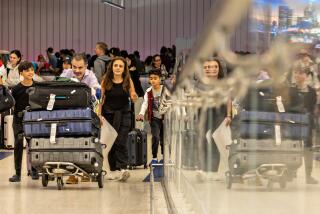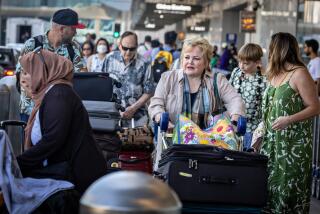Security Screening Now a Federal Case at Oxnard Airport
With little fanfare, Oxnard Airport welcomed a changing of the guard Tuesday, as federal workers trained in the wake of Sept. 11 began screening departing passengers.
The change, which had little effect on passengers boarding a Skywest Airlines flight to Los Angeles International Airport, is part of a federal overhaul of airport security that airports began phasing in earlier this year.
Most passengers had no idea the change had taken place Tuesday, but they welcomed the new security measures.
“Having somebody who’s been trained specifically for this job is inherently better,” said Jim Koss, an engineer en route to Washington, D.C. “I’m sure the [airline] workers did their best, but I’m not confident they had the necessary training and experience.”
Screeners must complete 40 hours of classroom instruction and 60 hours of on-the-job training.
The changes, mandated by a law passed by Congress after the terrorist attacks, require the federal government to hire and train thousands of screeners for the nation’s 429 commercial airports by Tuesday.
LAX completed phasing in its 1,600 federal screeners earlier this month. They will be joined by an additional 1,600 federal workers who will operate new bomb detection equipment in airport terminals by the end of the year.
At tiny Oxnard Airport, 11 federal screeners will check about 200 passengers who board six Skywest flights a day.
Although the 216-acre airport appears to be an unlikely site for terrorists, officials say the nation’s smallest airports could be vulnerable to people trying to circumvent security systems at larger airports.
“Where did Mohamed Atta start out that morning?” asked Jeff Spach, a spokesman for the Transportation Security Administration, referring to one of the Sept. 11 hijackers, who went through a checkpoint at a small airport in Portland, Maine, before boarding another plane at Logan International Airport in Boston.
“The very first thing we did in training was show them that video of him walking through security,” Spach said.
“This is a smaller airport than LAX, but their job is just as important.”
Passenger Lisa Krause of Chicago said it couldn’t hurt to make sure the smaller airports are properly staffed.
“People are less likely to slip through the cracks this way,” said Krause, a customer service representative with United Airlines.
“It’s a smaller airport, and this way they’re more likely to catch something unusual.”
More to Read
Sign up for Essential California
The most important California stories and recommendations in your inbox every morning.
You may occasionally receive promotional content from the Los Angeles Times.










